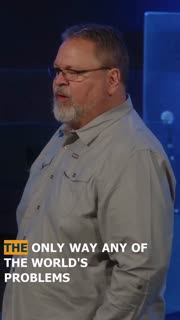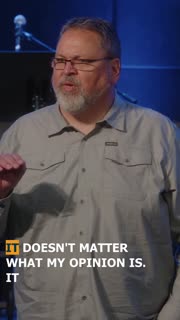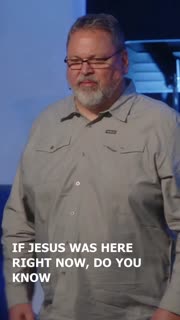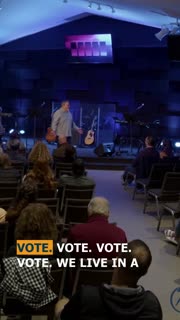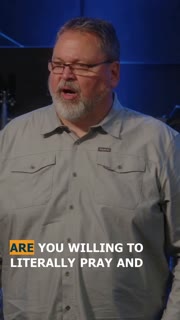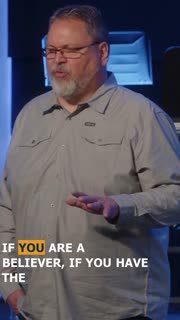Living Faith: Love Over Politics in Action
Devotional
Sermon Summary
Bible Study Guide
Sermon Clips
1) "The only way any of the world's problems get solved is they get solved spiritually. You want to change this world? Do you want to change this world? Then preach the gospel. Preach the gospel. Go out and share Jesus with your friends, neighbors." [11:40] (24 seconds)
2) "If my liberal friends who need Jesus have chosen to ignore me, then I didn't do my job. Because the whole idea of love, joy, peace, long suffering is to continue those relationships while still preaching the truth. If we somehow have alienated individuals who need Jesus, we've blown it." [13:39] (29 seconds)
3) "It doesn't matter what my opinion is. It doesn't. It doesn't matter what my opinion is. And it doesn't matter what your opinion is. In the long and short of life, in the reality of life, it does not matter what your opinion is. That's the feel-good sermon title of the year right there. This one's going to be titled, Peter. This one's going to be titled, Doesn't Matter What Your Opinion Is. What matters is what God's opinion is." [18:30] (35 seconds)
4) "The people Jesus hung out with were the outcasts, the looked down upon by the holy people. Let me say that again. The people that Jesus hung out with were the people that everyone else said, they're sinners, they're horrible, they're terrible, they're vile, they're unlawful. And who did he hang out with? He hung out with them." [19:21] (36 seconds)
5) "If Jesus was here right now, do you know what his sermon would be? It wouldn't be political. It'd be love. Love. Love. Love. I know, Pastor John, but our world, our country is in a mess. Of course it's in a mess." [25:02] (17 seconds)
6) "Vote. Vote. Vote. Vote. We live in a country where you get the privilege to vote. There are countries that people have, people died here so they could vote. Vote. Pray. You know what's more important than voting? Praying." [26:49] (24 seconds)
7) "Are you willing to literally pray and say, okay, Lord, I'll vote for whoever you tell me to vote for. I will definitely do it. And then do it. Because that's what you need to do. That's how this should be done. What's Holy Ghost, you are Lord. Holy Ghost, who am I supposed to vote for? How am I supposed to vote this election? And then do that, whatever that is." [32:15] (32 seconds)
8) "If you are a believer, if you have the spirit of God in you, you know that's evil. But here it goes back to, they wanted Jesus to affirm their belief. They wanted them to affirm. Instead of them just knowing what truth is and acting upon truth, they needed somebody else to affirm who they are." [29:00] (19 seconds)
9) "But love your enemies and do good and lend expecting nothing in return. And your reward will be great. And you'll be sons of the Most High God. For He is kind to the ungrateful and the evil. Be merciful, even as your Father is merciful. Be merciful. Vote. But don't turn this into us against them. Because when you turn it into us against them, the kingdom suffers." [49:18] (37 seconds)
Ask a question about this sermon
2) "If my liberal friends who need Jesus have chosen to ignore me, then I didn't do my job. Because the whole idea of love, joy, peace, long suffering is to continue those relationships while still preaching the truth. If we somehow have alienated individuals who need Jesus, we've blown it." [13:39] (29 seconds)
3) "It doesn't matter what my opinion is. It doesn't. It doesn't matter what my opinion is. And it doesn't matter what your opinion is. In the long and short of life, in the reality of life, it does not matter what your opinion is. That's the feel-good sermon title of the year right there. This one's going to be titled, Peter. This one's going to be titled, Doesn't Matter What Your Opinion Is. What matters is what God's opinion is." [18:30] (35 seconds)
4) "The people Jesus hung out with were the outcasts, the looked down upon by the holy people. Let me say that again. The people that Jesus hung out with were the people that everyone else said, they're sinners, they're horrible, they're terrible, they're vile, they're unlawful. And who did he hang out with? He hung out with them." [19:21] (36 seconds)
5) "If Jesus was here right now, do you know what his sermon would be? It wouldn't be political. It'd be love. Love. Love. Love. I know, Pastor John, but our world, our country is in a mess. Of course it's in a mess." [25:02] (17 seconds)
6) "Vote. Vote. Vote. Vote. We live in a country where you get the privilege to vote. There are countries that people have, people died here so they could vote. Vote. Pray. You know what's more important than voting? Praying." [26:49] (24 seconds)
7) "Are you willing to literally pray and say, okay, Lord, I'll vote for whoever you tell me to vote for. I will definitely do it. And then do it. Because that's what you need to do. That's how this should be done. What's Holy Ghost, you are Lord. Holy Ghost, who am I supposed to vote for? How am I supposed to vote this election? And then do that, whatever that is." [32:15] (32 seconds)
8) "If you are a believer, if you have the spirit of God in you, you know that's evil. But here it goes back to, they wanted Jesus to affirm their belief. They wanted them to affirm. Instead of them just knowing what truth is and acting upon truth, they needed somebody else to affirm who they are." [29:00] (19 seconds)
9) "But love your enemies and do good and lend expecting nothing in return. And your reward will be great. And you'll be sons of the Most High God. For He is kind to the ungrateful and the evil. Be merciful, even as your Father is merciful. Be merciful. Vote. But don't turn this into us against them. Because when you turn it into us against them, the kingdom suffers." [49:18] (37 seconds)
